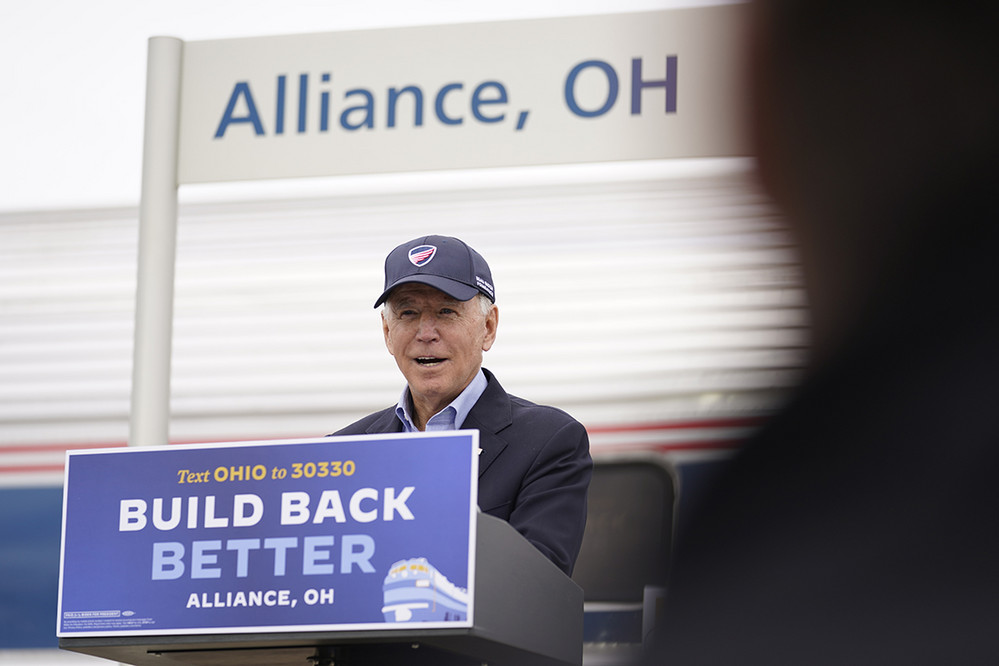 | BY GAVIN BADE | Presented by the Financial Services Forum | | 
Joe Biden speaks at Amtrak's Alliance Train Station, Wednesday, Sept. 30, 2020, in Alliance, Ohio. | Andrew Harnik/AP | LET ME BEND YOUR EAR — It’s long been assumed in Washington that President Joe Biden’s international trade policy is driven almost exclusively by electoral anxiety — specifically, anxiety over the Rust Belt states that Donald Trump flipped in 2016. Early in the administration, we reported that U.S. Trade Representative Katherine Tai told her colleagues that she believes free trade policies — specifically, the defunct Trans-Pacific Partnership — were a key reason Hillary Clinton’s Midwestern “blue wall” came crumbling down during that election. That fear has animated just about every trade policy decision she and the White House have made since — from preserving Trump’s tariffs on China to walking away from their own Asia-Pacific trade talks last year at the urging of Midwestern Democrats. But now, as Biden nears a rematch with Trump, that electoral angst over trade is reaching a fever pitch — both for the president and the Midwestern senators who will join him on the ballot this November. The latest flashpoint: U.S. Steel’s proposed acquisition by Japanese rival Nippon Steel. On its face, the deal appears to be good business. As we’ve pointed out, Nippon is a stable company based in a close allied nation that made a lucrative offer for the iconic American firm. The fact that the Japanese firm wanted to buy U.S. Steel at all is a testament to how Biden’s industrial policies have put the once-mighty company back on firmer ground, by juicing demand for steel to build the clean energy and microchip factories springing up across the nation. But the political optics of selling an American stalwart into foreign control are a different matter entirely. Trump quickly said he would block the deal on his first day back in office, and the United Steelworkers — the powerful union whose members could be the difference in states like Pennsylvania — is also vehemently opposed to the deal. Those dynamics have spooked the Democratic senators running in U.S. Steel’s territory, like Sens. Sherrod Brown of Ohio and Bob Casey of Pennsylvania. And they haven’t been shy about sharing their fears with the White House. Earlier this month, Casey placed a call to White House chief of staff Jeff Zients, warning him that allowing the acquisition to be completed could put thousands of union steel jobs at risk — and create an opening for Trump. “After making the point about not losing those union jobs … I also made the point that I thought the Republican nominee would make [the U.S. Steel deal] a big issue,” Casey told POLITICO on Capitol Hill this week. The next day, Biden came out against the deal, saying in a statement that it is “vital” for U.S. Steel to “remain domestically owned and operated.” Casey wasn’t the only Rust Belt Democrat backchanneling with the White House. Brown also had multiple conversations with White House economic adviser Lael Brainard about the potential acquisition of U.S. Steel in recent months, and even had a phone call with Biden himself on trade and industrial policy topics earlier this year. The president called USW President David McCall on the day he came out against the deal. Less than a week later, the union endorsed Biden for reelection. The interactions are just one illustration of how influential Democratic industrial state senators — Brown, Casey and Tammy Baldwin of Wisconsin, specifically — have been pushing Biden toward ever-more-populist trade and economic policies. And they reflect how intensely Democrats are focused on denting Trump’s economic message with blue collar workers across the Midwest. “For both presidential politics and Senate politics there appears to be a lot of deference to trying to figure out how to hold those states in the Democratic column,” said Peter Harrell, who led the international economics team on Biden’s National Security Council until late 2022. But while the senators say they appreciate Biden’s coordination, they stress there are other trade actions they want him to take, and big open questions about how his administration will follow up on the U.S. Steel deal with actions, and not just rhetoric. There’s more on that in our latest look at the forces shaping America’s trade policies in this superheated election year. Welcome to POLITICO Nightly. Reach out with news, tips and ideas at nightly@politico.com . Or contact tonight’s author at gbade@politico.com or on X (formerly known as Twitter) at @GavinBade .
| |
| | A message from the Financial Services Forum: Americans, especially low- and moderate-income consumers, will bear the brunt of Basel III Endgame. The new requirements would make borrowing more expensive, making it harder for Americans to take out a mortgage, buy a car, or secure a small business loan. Learn more. | | | | | MAGA GOP BRINKSMANSHIP!
— House sends $1.2T funding deal to Senate ahead of midnight shutdown cliff: The House approved a $1.2 trillion funding package today , sending the colossal measure off to the Senate with just hours to spare before federal cash expires for most of the government after midnight. Speaker Mike Johnson leaned heavily on Democratic votes to pass the package in a 286-134 vote, his usual practice with spending legislation ever since he assumed the gavel five months ago. Just 101 Republicans supported the measure, falling short of a majority of the GOP conference. — Kate Middleton has been diagnosed with cancer, she announced: Catherine, the Princess of Wales, has been diagnosed with cancer , she has announced. POLITICO Europe reports, she said in a video statement: “In January, I underwent major abdominal surgery in London and at the time, it was thought that my condition was non-cancerous. The surgery was successful. “However, tests after the operation found cancer had been present. My medical team therefore advised that I should undergo a course of preventative chemotherapy and I am now in the early stages of that treatment.” — House Dems could have Johnson's back on ouster threat — if Ukraine aid gets a vote: House Democrats say Speaker Mike Johnson has an option to control his future over a motion to vacate from Rep. Marjorie Taylor Greene (R-Ga.): putting a Ukraine aid package on the floor. Several Democrats from across the ideological spectrum said in interviews with POLITICO they would motion to table Greene’s resolution — if it came to a vote — if Johnson put a Ukraine aid package on the House floor for a vote. All Democrats previously voted to oust former Speaker Kevin McCarthy along with a group of Republicans last fall.
| |
| | SUBSCRIBE TO GLOBAL PLAYBOOK: Don’t miss out on POLITICO’s Global Playbook, the newsletter taking you inside pivotal discussions at the most influential gatherings in the world, including WEF in Davos, Milken Global in Beverly Hills, to UNGA in NYC and many more. Suzanne Lynch delivers the world's elite and influential moments directly to you. Stay in the global loop. SUBSCRIBE NOW . | | | | | | | MCDANIEL MOVES — Ronna McDaniel, who stepped down as chair of the Republican National Committee earlier this month, will join NBC News as a political analyst starting Sunday , POLITICO reports. McDaniel is expected to contribute to both NBC and MSNBC. Her first appearance will be on Sunday on “Meet the Press,” where she will give her first interview since stepping down from the RNC. VANCE RISING — At a fundraiser in New York, Donald Trump asked donors what they thought of Arizona Senate candidate Kari Lake as a running mate. In recent conversations, the former president has appeared fixated on Ohio Sen. JD Vance , CNN reports. And Florida Sen. Marco Rubio, New York Rep. Elise Stefanik, former Trump Cabinet official Ben Carson and even former South Carolina Gov. Nikki Haley are among some of the names on a lengthy list Trump has mentioned over the past several months. PUERTO RICO PRIORITY — Puerto Ricans on the island can’t vote for president this November. But voters who are from the U.S. territory are becoming a major priority for Joe Biden’s campaign , NBC writes. Trading in chilly Washington for tropical temperatures, Vice President Kamala Harris landed in Puerto Rico Friday for her first official visit to Puerto Rico since taking office, touting the Biden administration’s support for the island as it continues to rebuild following several hurricanes. The vice president highlighted how the Biden administration has invested more than $140 billion in Puerto Rico to improve infrastructure, support clean energy and increase access to capital for small businesses. She visited a home outside San Juan to show how a program funded by the Department of Housing and Urban Development is helping rebuild and repair homes.
| |
| | A message from the Financial Services Forum:  
| | | | | | 
A fuel storage facility burns after Russian attacks in the city of Kalynivka, on March 25, 2022. | FADEL SENNA/AFP via Getty Images | PUTIN’S BOMBARDMENT — Russia launched a huge barrage of missiles and drones at Ukraine’s energy infrastructure overnight, leaving several cities without electricity and damaging the Dnipro hydropower plant, Ukraine's biggest dam, POLITICO Europe reports. Ukrainian President Volodymyr Zelenskyy said the Kremlin fired more than 60 drones and almost 90 missiles at Ukraine , targeting power plants and energy supply lines. Kharkiv, Zaporizhzhia, Sumy, Poltava, Dnipropetrovsk, Odesa and Khmelnytskyi were among the areas left without electricity, Zelenskyy said in a statement Friday morning. Ukrainian air defense forces reported shooting down 37 missiles and 55 drones. At the same time, Washington has asked Ukraine to halt drone strikes on Russia’s oil refineries, out of fear of driving up crude oil prices and provoking retaliation, according to a report Friday by the Financial Times . TERROR ATTACK — At least three gunmen dressed in camouflage opened fire on concert-goers during what authorities called a terrorist attack at a well-known music venue in Moscow on Friday night, according to Russian state media. Russian state-run news channel RIA Novosti, citing Russian intelligence, reported that “several” people had been killed or wounded. RIA Novosti also reported that one of the assailants had thrown an incendiary device or grenade toward the crowd, resulting in a fire. Another Russian news agency, Interfax, reported that the assailants began firing automatic rifles at the entrance of the main hall while the concert was ongoing, according to an unnamed rescue worker. Photos circulating on social media showed large billows of smoke rising up in the night sky.
| |
| | Easily connect with the right N.Y. State influencers and foster the right relationships to champion your policy priorities. POLITICO Pro. Inside New York. Learn more . | | | | | | | | |
| | | COLLEGE DAZE — As this year’s college-admissions season nears its close, with decisions arriving from schools this month, it is already shaping up as the craziest ever. Applications to the 1,000-plus colleges that are part of the Common Application are up six percent over last year’s total, which was already a record. It’s a continuation of a dynamic that began in the spring of 2020, when the pandemic forced hundreds of top-ranked colleges to drop their requirements for standardized-test scores and generated a surge of applications as a result. More applicants, new rules, even less clarity from schools — it’s stressing out both students and college administrators. And so much about how selective colleges evaluate applicants , writes Jeffrey Selingo for New York magazine, is more opaque than ever.
| 
On this date in 1968: Sen. Robert Kennedy waves to an audience of students as as he arrives on stage at the University of Alabama in Tuscaloosa. | Horace Cort/AP Photo | Did someone forward this email to you? Sign up here .
| |
| | A message from the Financial Services Forum: State pension fund management systems like CalPERS have warned that regulators' current proposal is likely to reduce returns for people saving for retirement. With Americans still recovering from steep prices for gas and groceries, now is not the time to raise costs further.
It's no wonder a bipartisan group of lawmakers, former policymakers, business groups, academics, and nonprofit leaders have raised concerns over the proposal's potential impacts. See the cost. | | | | |
|
| | Follow us on Twitter | | | FOLLOW US | | |
| |
No comments:
Post a Comment
Note: Only a member of this blog may post a comment.